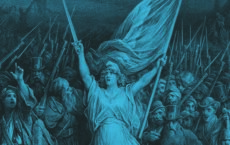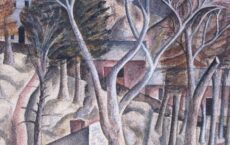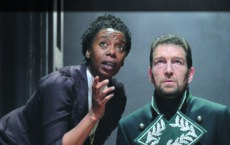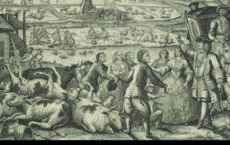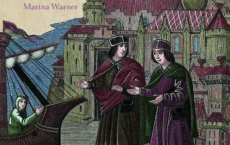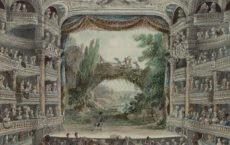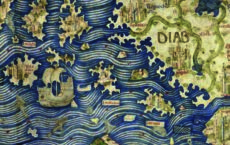
In the classic film Casablanca, the Frenchwoman Yvonne, one of the regulars of Rick’s Café, joins the other refugees assembled there to sing the Marseillaise, boldly defying the Nazi officers present. She concludes her national anthem with a shouted “Vive la France!”, tears streaming down her face. We now know that the tears were not […]
Read MoreNostalgia has become a defining emotion of twenty-first-century Western culture. From endless film franchise reboots, to the Eras Tour, to the 1980s world of Stranger Things, our media seems perpetually transfixed by the past. Nostalgia—the bittersweet yearning for an absent home—has a remarkable power to enchant us, for good or ill. It can, in the […]
Read MoreA lot of ethical programs are predicated on ideas of sameness and reciprocity. These programs urge us to imagine other people as similar to ourselves and to treat them accordingly. This is the essence of the biblical teaching to ‘Love thy neighbor as thyself’ and is the gist of the so-called Golden Rule: ‘Do unto […]
Read More“Your cattle are public enemies now,” a state veterinary scientist tells Homer Bannon, an aging cattle rancher in Larry McMurtry’s 1961 novel Horsemen, Pass By, shortly before he compels Homer to drive his livestock into a large pit to be slaughtered and buried. This haunting scene in the novel (and in its film adaptation, Hud) […]
Read MoreOn Friday 9 June 1458, a pirate ship swerved and fired on two Bristolian trading boats as they passed the coast of Malta, on their return from the Levant. I found the event transcribed in a legal document. I could see the inky vessels with their lost signatures, the Katherine Sturmy and the Marie, trapped […]
Read MoreNapoleon Bonaparte: Corsican, illustrious general, First Consul, Emperor of the French, exile, prisoner. It’s quite a CV. He was also a PR expert ahead of his time, and one of his chosen media for this was the theatre. Theatre had the potential to reach thousands of spectators and, when it was reported in the press, […]
Read MoreWhat did it mean to travel in the premodern world – long before passports, maps, or reliable roads? Countless surviving yet often overlooked accounts open a window onto a time when people from Asia, Africa, and Europe journeyed immense distances on foot, by caravan, or across unpredictable seas. Their stories reveal not only the physical […]
Read MoreIn Shakespeare’s Julius Caesar, Marc Antony famously begins his funeral oration by exclaiming, “Friends, Romans, countrymen, lend me your ears.” This is an elegant way of asking for attention. At the same time, it engages with important ideas about ears and audition in the early modern period and the degree to which listening might be […]
Read MoreIn the classic film Casablanca, the Frenchwoman Yvonne, one of the regulars of Rick’s Café, joins the other refugees assembled there to sing the Marseillaise, boldly defying the Nazi officers present. She concludes her national anthem with a shouted “Vive la France!”, tears streaming down her face. We now know that the tears were not […]
Read MoreNostalgia has become a defining emotion of twenty-first-century Western culture. From endless film franchise reboots, to the Eras Tour, to the 1980s world of Stranger Things, our media seems perpetually transfixed by the past. Nostalgia—the bittersweet yearning for an absent home—has a remarkable power to enchant us, for good or ill. It can, in the […]
Read MoreA lot of ethical programs are predicated on ideas of sameness and reciprocity. These programs urge us to imagine other people as similar to ourselves and to treat them accordingly. This is the essence of the biblical teaching to ‘Love thy neighbor as thyself’ and is the gist of the so-called Golden Rule: ‘Do unto […]
Read More“Your cattle are public enemies now,” a state veterinary scientist tells Homer Bannon, an aging cattle rancher in Larry McMurtry’s 1961 novel Horsemen, Pass By, shortly before he compels Homer to drive his livestock into a large pit to be slaughtered and buried. This haunting scene in the novel (and in its film adaptation, Hud) […]
Read MoreOn Friday 9 June 1458, a pirate ship swerved and fired on two Bristolian trading boats as they passed the coast of Malta, on their return from the Levant. I found the event transcribed in a legal document. I could see the inky vessels with their lost signatures, the Katherine Sturmy and the Marie, trapped […]
Read MoreNapoleon Bonaparte: Corsican, illustrious general, First Consul, Emperor of the French, exile, prisoner. It’s quite a CV. He was also a PR expert ahead of his time, and one of his chosen media for this was the theatre. Theatre had the potential to reach thousands of spectators and, when it was reported in the press, […]
Read MoreWhat did it mean to travel in the premodern world – long before passports, maps, or reliable roads? Countless surviving yet often overlooked accounts open a window onto a time when people from Asia, Africa, and Europe journeyed immense distances on foot, by caravan, or across unpredictable seas. Their stories reveal not only the physical […]
Read MoreIn Shakespeare’s Julius Caesar, Marc Antony famously begins his funeral oration by exclaiming, “Friends, Romans, countrymen, lend me your ears.” This is an elegant way of asking for attention. At the same time, it engages with important ideas about ears and audition in the early modern period and the degree to which listening might be […]
Read MoreKeep up with the latest from Cambridge University Press on our social media accounts.
Johan Adam Warodell is the author of the monograph Conrad’s Decentered Fiction (Cambridge University Press 2022) and numerous articles on Joseph Conrad. He is a Trustee of the Joseph Conrad Society of America and a Research Associate at the University of Sussex.
Montclair State University, New Jersey
Heather Hirschfeld is a Professor of English at the University of Tennessee.
Alice Tranah grew up in Cambridge and, after studying history at University, fell delightely into life as a bookseller, first in London and then here for Cambridge University Press Bookshop.
University of Bristol
Canterbury Christ Church University, Kent
Associate Professor in English and Creative Writing, University of Reading
University of Pennsylvania
Staff Scientist, Brigham and Women’s Hospital, Department of Neurology with affiliation to The Broad Institute of Harvard and MIT.
Speaking Shakespeare Today
Helen Wilcox, Professor of English at Bangor University
Playing Hesiod
Shakespeare’s Possible Worlds
The Cambridge Companion to American Civil Rights Literature
Yeats and European Drama
Nineteenth-Century American Literature and the Long Civil War
Grief and Women Writers in the English Renaissance
Imagining Medieval English
The Cambridge Companion to French Literature
The Cambridge Introduction to Theatre and Literature of the Absurd
Paul Salzman is Emeritus Professor of English at La Trobe University, Australia.
Sarah C. E. Ross is Senior Lecturer in the English Programme, at Victoria University of Wellington.
Stuart Sillars is Professor of English at the University of Bergen, Norway.
The Cambridge Introduction to William Wordsworth
The Poetry of War
Doubt and Skepticism in Antiquity and the Renaissance
Marketing associate
You Know what I Mean?
Samuel Johnson, the Ossian Fraud, and the Celtic Revival in Great Britain and Ireland
The Cambridge Companion to Bob Dylan
Japan Rising
The Cambridge Companion to Baseball
Library marketing associate
College Marketing Associate
The Cambridge Companion to Baseball
Publicist
London: A Social and Cultural History, 1550–1750
The American 1930s
The Places of Wit in Early Modern English Comedy
The King James Bible after Four Hundred Years
The King James Bible after Four Hundred Years
The Cambridge Companion to Creative Writing
London: A Social and Cultural History, 1550-1750
The Cambridge Introduction to Charles Dickens
Publicist
Associate director of sales and marketing
The Letters of Ernest Hemingway, Volume 1
Assistant sales manager
Senior Inbound Marketing Executive
Literary Criticism from Plato to Postmodernism
From Dickens To Dracula
A Reference Grammar of French
The Short Story and the First World War
Mrs Dalloway
Gender and Race in Antebellum Popular Culture
The Cambridge Companion to Modernist Culture
The Cambridge Companion to American Science Fiction
Popular Literature, Authorship, and the Occult in Late Victorian Britain
Paradise Lost and the Cosmological Revolution
Ovid and Hesiod
Reading and Writing during the Dissolution
Cambridge Companion to Popular Fiction
Cambridge Companion to Popular Fiction
Publisher
The Cambridge Companion to \'Pride and Prejudice\'
The Cambridge Companion to Football
Failure and the American Writer
Eating and Ethics in Shakespeare\\\\\\\'s England
To receive updates on Literature news from Cambridge University Press and Fifteen Eighty Four, please join our email list below. We will not disclose your email address to any third party


